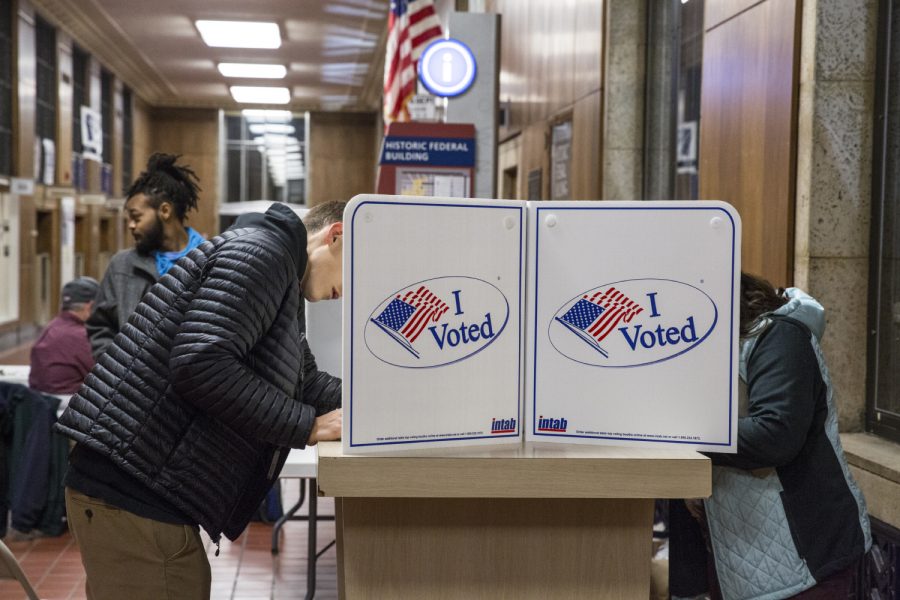Opinion: Iowa voter-identification requirements should include student IDs
Even if voter fraud were a problem, Iowa’s solution is unnecessarily restrictive.
Voters fill out their ballots at a polling location in the Historic Dubuque Federal Building in Dubuque on Tuesday Nov. 6, 2018.
October 9, 2019
Amid our tumultuous political news, it’s often said that the only real way to fix things is to vote. It’s a simple, tangible solution to our complex, abstract issues in government. The only problem is that voting isn’t that simple.
Fifth District Judge Joseph Seidlin gave a mixed ruling Sept. 30 on Iowa’s controversial 2017 voter-ID law. While the court overturned several problematic components of the law, such as signature-matching checks on IDs, it upheld the legality of Iowa’s requirement that voters present one of six forms of identification, all of which include a photo, signature, and expiration date.
The ruling leaves Iowa one of 17 states with strict voter-ID requirements, meaning that ballots are not counted unless they are presented alongside an accepted form of identification. Of those 17, Iowa is one of just seven states that doesn’t allow student IDs for this purpose.
Voter-ID laws are meant to secure elections, but such laws are a solution to the nonexistent problem of voter fraud. A comprehensive Washington Post study found only four cases nationwide in 2016. In contrast, September’s court case found nearly 10 percent of eligible Iowans lacked the listed identifications.
If policymakers really want to protect against this nonproblem despite the data, the least they could do is make it less exclusionary by adding student IDs to the list of acceptable forms of recognition.
Iowa students — especially those in their dorm-dwelling years — are disproportionately affected by voter-ID laws. These largely out-of-state newcomers tend to have no Iowa driver’s license, no documentation in Iowa’s legal system, and no incentive to acquire either of those things. The result is that students are discouraged from democratic participation from the moment they move on campus.
The main legal argument against student IDs is that they don’t have an expiration date, so there’s no way to verify that the individual is still an Iowa resident. This predicament is a relatively easy fix, and it’s already been done elsewhere. Iowa State University IDs, as of this academic year, are allowed to be used to vote because they have expiration dates.
Asked if the University of Iowa planned to follow suit earlier this year, UI officials told The Daily Iowan that the cost of reprinting the IDs would be in the hundreds of thousands of dollars. With more than 40,000 IowaOne cards out there, the cost of remaking everyone’s card — especially if the switch were to happen all at once — would be expensive.
Additionally, student IDs are easier to replace than standalone voter IDs, so losing them is less of a problem. An IowaOne card may be replaced without leaving campus by presenting any government-issued ID from within the U.S. rather than an arbitrary list of six that can be issued.
The state of Iowa at least offers a free voter ID in the mail to those who don’t have one, which is helpful but isn’t convenient for students who sometimes move every year and would have to update their addresses in the voter-registration system. But the original point still stands: the current voter-registration system is too large of a hurdle to have in a fair democracy. Voting must be accessible, and it should not be the universities’ responsibility to pay so their students can cast a ballot.
Students in dorms, the ones with the lowest likelihood of carrying other IDs, are conveniently the most likely to keep track of their UI-issued cards, as they serve multiple nonvoting purposes. Dual-use cards such as these are the ideal forms of voter ID because they’re less likely to get lost and more likely to be carried. This means no scrambling to find voting credentials the hour before the polls close, which for many students is enough of a hassle to make the endeavor of voting not worthwhile.
Iowa could effortlessly pivot from a policy that restricts voters to one that enables them. Besides suppressing turnout, there’s no reason not to make that change.
Columns reflect the opinions of the authors and are not necessarily those of the Editorial Board, The Daily Iowan, or other organizations in which the author may be involved.





